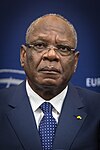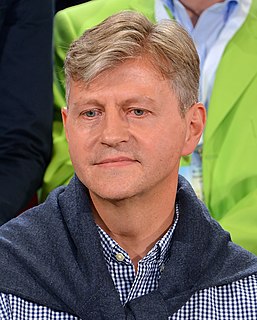Mountaga Tall is a Malian politician who is President of the National Congress for Democratic Initiative (CNID) and served in the government of Mali as Minister of Higher Education and Scientific Research from 2014 to 2016 and Minister of the Digital Economy and Communication from 2016 to 2017. Previously he was First Vice-President of the National Assembly of Mali from 2002 to 2007.
Tiébilé Dramé is a Malian politician who served in the government of Mali as Minister of Foreign Affairs from 1991 to 1992. In the years since he has remained active on the political scene, while also acting as a diplomat and mediator in regional crises.

The Alliance for Democracy in Mali – Pan-African Party for Liberty, Solidarity and Justice is a political party in Mali.

Presidential elections were held in Mali on 29 April 2007. Incumbent president Amadou Toumani Touré ran for re-election against seven other candidates and won in the first round with about 71% of the vote.

A parliamentary election was held in Mali on 1 July 2007 and 22 July. In the first round, there were about 1,400 candidates for 147 seats in the National Assembly.
The Front for Democracy and the Republic is an opposition coalition in Mali that fought the presidential election on 29 April 2007 and the parliamentary election of 1 July and 22 July 2007. The FDR is an umbrella organisation, bringing together 16 independent political parties and groups. It rejected the official results of the election, according to which incumbent president Amadou Toumani Touré won with about 71% of the vote, and alleged fraud, unsuccessfully asking the Constitutional Court to annul the election. On 19 May, the leading FDR candidate, National Assembly president Ibrahim Boubacar Kéita, said that the group would abide by the court's decision to confirm Touré's victory and would concentrate on the July 2007 parliamentary election.

Dioncounda Traoré is a Malian politician who was President of Mali in an interim capacity from April 2012 to September 2013. Previously he was President of the National Assembly of Mali from 2007 to 2012, and he served as Minister of Foreign Affairs from 1994 to 1997. He was President of the Alliance for Democracy in Mali-African Party for Solidarity and Justice (ADEMA-PASJ) beginning in 2000, and he was also President of the Alliance for Democracy and Progress (ADP), an alliance of parties that supported the re-election of President Amadou Toumani Touré in 2007.

Niankoro Yeah Samake is a social entrepreneur and politician from Ouelessebougou, Mali. Samake served as the Malian Ambassador to India. He was nominated by the Malian President Ibrahim Boubacar Keita in May 2015 and he assumed the post in 2015. Samake is the executive director of the Empower Mali Foundation, former mayor of Ouelessebougou, Vice President of Mali's League of Mayors, and was a candidate in the 2013 Malian presidential election.

Parliamentary elections were held in Mali on 24 November 2013. President Ibrahim Boubacar Keïta's party, Rally for Mali, won 66 of the 147 seats in the National Assembly, with its allies winning an additional 49 seats, giving it a substantial majority. The Union for the Republic and Democracy, led by Soumalia Cissé, won 17 seats, becoming the Opposition.

Presidential elections were held in Mali on 28 July 2013, with a second round run-off held on 11 August. Ibrahim Boubacar Keïta defeated Soumaïla Cissé in the run-off to become the new President of Mali.
Dramane Dembélé is a Malian politician who served in the government of Mali as Minister of Urban Planning and Housing from 2015 to 2016. A mining engineer by profession, he was Director-General of Geology and Mines from 2005 to 2010. He was the candidate of the Alliance for Democracy in Mali (Adéma-PASJ) for the July 2013 presidential election.
Karim Keïta is a Malian politician and businessman. He is a member of the National Assembly since 2013. Keïta is the son of Malian President Ibrahim Boubacar Keïta.
Events in the year 2018 in Mali.
Events in the year 2019 in Mali.

Keïta Aminata Maiga, also Aminata Maïga Keïta, is a Malian healthcare, public health, and children's advocate. She has served as the First Lady of Mali since September 4, 2013, as the wife of President Ibrahim Boubacar Keïta. During her tenure as first lady, Maiga has promoted improvements in healthcare, education, the welfare of mothers and children, the environment and athletics. Maiga, an opponent of child marriage, launched a national campaign in October 2015 to end the practice in Mali.

On March 23, 2019, several attacks by gunmen killed a reported 160 Fulani herders in central Mali. The violence came in the aftermath of the Malian government cracking down on Islamic terror cells in the country. Two villages, Ogossagou and Welingara, were particularly affected.

















